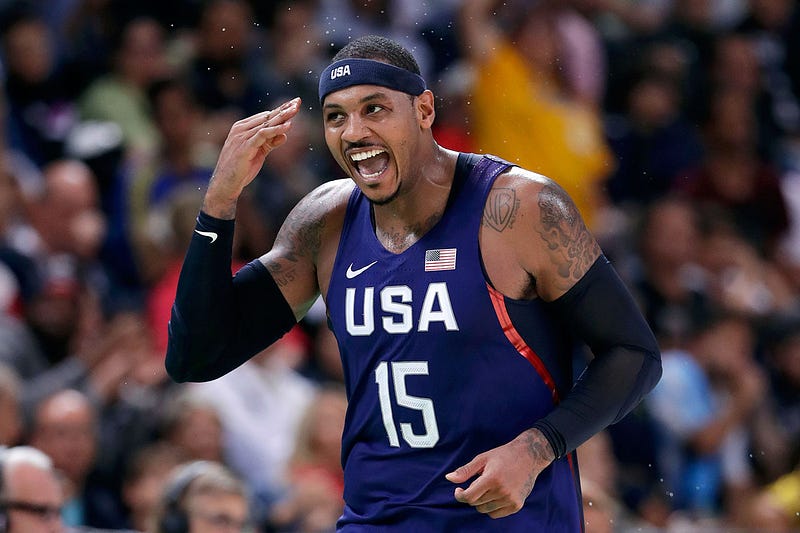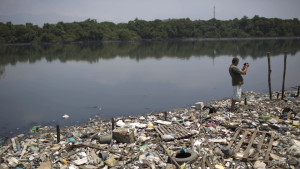
Many players who have played in the Olympics often talk about how there is nothing quite like it in sports. They’ll tell you that the Games are different from regular athletic events because players are competing for the love of sport and country instead of just for a team. Inevitably, players who win medals are compared to those who win championships in their sport. The debate turns to whether or not winning a championship in a sport is the same as winning a gold medal in the Olympics.
And that’s where we turn our attention to Carmelo Anthony.
You know Carmelo Anthony as one of the unquestioned leaders of the United States basketball team and one of the most well-known players in the NBA. Participating in his fourth Olympics, he has basically seen it all in his decade-plus of international basketball. The other thing you know about ‘Melo is that he’s never won an NBA championship or even gone to an NBA Finals. He’s almost more famous for his failure than he is for his success, even though he’s never had a great team around him in the NBA career. While he’s earned two Olympic gold medals and a bronze medal in 2004, he’s never earned what many refer to as the most cherished prize in sports: a championship.
So when he talks about the comparison between a gold medal and a ring, it’s probably something worth noting. Sure enough, he expounded on the subject in an interview with ESPN; this is what he said:
Most athletes don’t have an opportunity to say that they won a gold medal, better yet three gold medals. I would be very happy walking away from the game knowing that I’ve given the game everything I have, knowing I played on a high level at every level: high school, college, won [a championship at Syracuse] in college and possibly three gold medals.
I can look back on it when my career is over — if I don’t have an NBA championship ring — and say I had a great career.
First of all, notice how he seamlessly worked in the phrase “if I don’t have an championship ring”. Not only did that line add context to his remarks but it also likely saved him from further scrutiny among fans and the media. That critical insertion made it sound like an NBA championship ring would be the holy grail of his career and anything else would be viewed as a disappointment.
But there is a multi-pronged debate to be had over whether or not an Olympic gold is more significant than a championship ring, regardless of what Anthony actually believes.
For starters, not every competitor in these Olympics has the chance to say that they play in a league that has a championship. For athletes like swimmers and gymnasts, the Olympics are absolutely the be-all, end-all of their athletic careers. They’re also unlike some professional athletes in that they don’t make the same crazy, lucrative salaries that players in other sports make. After all, a guy that played 24 minutes per game last season just received a new contract for four years and $50 million because there was just that much money in the NBA this year.
Yes, I’m sure there are some Olympic athletes who would kill for that much money. But then again, some athletes train their entire lives just to be part of the Olympics. Take America’s two new favorite sports (gymnastics and swimming), for example. Athletes such as Simone Biles, Michael Phelps, Aly Raisman, and Katie Ledecky don’t necessarily compete in prestigious leagues or even any league at all. There are world championships that many athletes compete in either to qualify or prepare for the Games, but these championships pale in comparison to winning big in the Olympics. Those athletes can’t sympathize with what Carmelo is talking about because they aren’t in situations where you can choose between one or the other.
Going back to ‘Melo, though, it’s understandable that he would value (or play up the value) of winning a gold medal over winning an NBA title. Anthony’s career has taken him many different places but he’s never gone to the supposed promised land of winning a title. Therefore, he has to think of his promised land as the Olympics and the ability to compete for the United States. It’s clear that ‘Melo has gained a lot of perspective over the course of his career and has definitely matured from his younger years. That should be applauded, even as he’s failed to win in his NBA career.
At the same time, he did kinda sorta admit that he’s probably not going to win a championship anytime soon, if ever. That might not sit well with the Knicks organization or the team’s fanbase, but the sentiment is absolutely based in reality. Despite Derrick Rose’s claim that the Knicks are a super team (yes, he really did say that), the team is closer to being an 8-seed than an NBA champion. Anthony realizes that and knows that he’s not going to have a chance to win a title in the coming years.
With all of this being said, I have no problem with ‘Melo taking a stand and speaking his mind on exactly what is important to him in his basketball career. And this is the reality of the situation: not every star can win a championship in the NBA. Winning a title is really, really hard; we saw this with the Golden State Warriors, the greatest team of all time, this past season. They couldn’t finish the deal against the Cavaliers in the Finals, showing us that going the distance in the NBA is very difficult, even as a 73-game winner.
Some people will undoubtedly be ruffled by Anthony’s comments. They’ll say that he doesn’t care about winning and he’s making the Olympics about himself and so on and so forth. Some people will also reject Anthony’s notion on the grounds that winning a ring is the single most important thing in an athlete’s career. Personally, I understand both sides of the argument. It’s up for interpretation.
But let’s respect Carmelo for being honest with us about what really matters in his career and his life. After all, it’s all we say we ever want out of our athletes.



